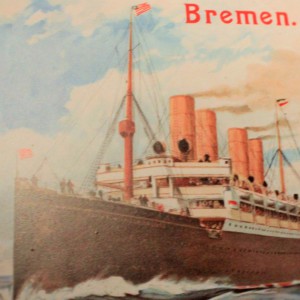We are all migrants. Part 1 Letters from Polish emigrants in America.
 Letters from Polish emigrants sent from the promised land
Letters from Polish emigrants sent from the promised land
This post is based on the exhibit called “We are all migrants. Letters from Polish emigrants in America from the end of the 19th century, ” that ran from September 24th to October 27th, 2016 at the Poznan Culture Center Castle. It was organized by Natalia Bloch and Wojciech Luchowski, and partnered with the Warsaw State Archive, Ethnographical museum in Torun, Institute of Ethnology and Cultural Anthropology of Poznan University, and the Migration Research Center.
The exhibit showcased letters written in 1890-1891 by Polish born citizens who immigrated to North and South America from Russian-Poland. They were meant for families living in Golub, Dobrzyn, Rypin, and Lipno counties, but were intercepted and censored on command of the Tsar, and never reached their intended addressees.
Forgotten for 50 years, thousands of these letters were discovered by accident by historian Witold Kula in 1941, stored in boxes in the basement of the Archives of Historical Records in Warsaw. During WWII he participated in secret teachings, and his students analyzed, decrypted, and translated these letters, which were mostly written by illiterate peasants. Unfortunately, most of them were lost to fire during the Warsaw Uprising, but 367 survived.
Where we immigrated
Poles were one of the first nations that immigrated to both North and South America. From the mid-19th Century, until WWI, it is estimated that 2.5 million people from partitioned Poland immigrated to the United States, and another 100,000 to Brazil. In fact, around the year 1900 Chicago was one of the biggest Polish populated cities in the world, next to Warsaw and Lodz.
Emigrating from the Russian part of Poland
There were many different reasons behind this mass migration, the majority of which resulted from economic crises in the countryside; obligatory long-term service in the Russian Army; rising antisemitism; and overpopulation, which lead to further social and economic impoverishment. Other reasons included escaping from debts, spinsterhood, and domestic violence.
Poverty was the main reason people chose to leave. With the drop in prices of grain in the European markets, their farms were too small to make a living and feed their numerous children, and families were in danger of becoming indentured servants.
The emigrants were attracted by dreams of a better life, which were fueled by news from those who left before them. The United States, in the beginning of an industrialization growth, absorbed the workers, who in turn helped build the nation’s power; Brazil, on the other hand, had recently abolished slavery and needed new workers for farming.